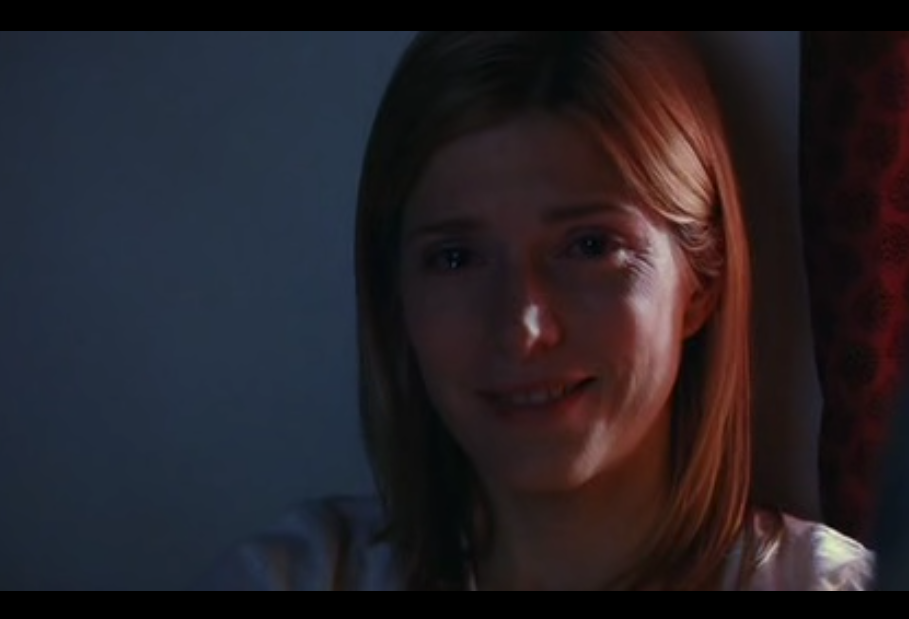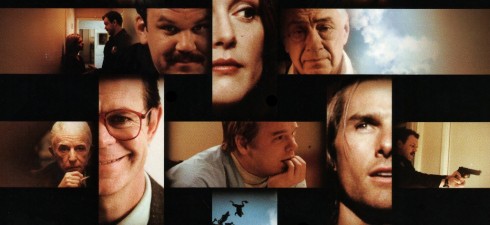
Paul Thomas Anderson’s Magnolia (1999) shows us (to use David Lynch’s words:) people ‘in trouble’. Like Altman’s Short Cuts, the film revolves around the strangely interconnected lives of a number of families in the city, each trying to navigate crises that seem to be veering further and further off-track. Jimmy is a game-show host who has terminal cancer, and is alienated from his daughter Claudia, who won’t speak to him. Claudia herself struggles with drug abuse and relationships, and a disturbance in her flat leads to Jim, a lonely policeman, to an awkward encounter. Elsewhere, Donnie is a former whizz-kid whose winnings from a game-show were taken by his parents, a symbol of his lost childhood, ‘sold’ to leave him with only his drink and an obsession with a barman who is beyond his reach. Each of these stories is a tale of struggle with the past: of regrets and histories beyond their control.
Tom Cruise plays one of the most memorable roles in the film: the maniacal Frank Mackey, who runs a self-help seminar called ‘Seduce and Destroy’ (warning: not for the easily offended). A ridiculous and brilliant parody of the culture of the ‘motivational’ speaker, Cruise’s performance cuts down to the basic reality: that so much self-help is mired in the phallocentric power systems of Western culture. ‘Seduce and Destroy’, like real-life seminars of this kind, promise the attendees that they can (with these top tips) wrest power back from the randomness and complexity of life, and turn it into an easily controlled system. As Mackey is interviewed backstage, however, his troubled past is uncovered, leading to an outburst of violence, and moving him towards a place where he can talk to his father: a complex and unresolved source of anger.
Each of the characters need something to save them: and thankfully, Magnolia is a film with a chorus. In surely the oddest moment of an already-unusual film, Anderson has his characters sing a few lines each from Aimee Mann’s ‘Wise Up’. The refrain of the song repeats: ‘It’s not going to stop/’til you wise up’. We’ve seen the characters of the film struggle through their painful lives for a while. Now, in a moment of resigned communion, we see them each take a breath, and sing their realisation. The song ends with ‘No, it’s not going to stop/ So just. . . give up’.
What does it mean for you, to ‘give up’? Like the characters of Magnolia, perhaps each of us can identify a source of difficulty in our tendency to doggedly hang on to the patterns and roles that we have created in order to survive through our painful moments. Letting go of these habits may feel like surrender: something that will take away the essence of who we are. Perhaps we’ll never ‘wise up’: but the film gives a glimmer of hope, that sometimes a random event may bring us to where we can’t bring ourselves.
Suddenly from the sky, millions of frogs rain down on the city, smashing through a skylight to knock the gun from Jimmy’s hand as he is about to kill himself. Frogs knock Donnie from a pole which he is trying to climb to break into his workplace, smashing his mouth on the ground so he’ll now need the oral surgery he wanted. After the frogs stop falling, Jim sees his lost gun fall from the sky in front of him: the classic filmic symbol of agency. He goes to visit Claudia, and tells her that he wants to make it work with her. The brilliant close of the film is a long shot on her resigned face, which suddenly flickers into a smile.
 I love Magnolia because of its heart. Our relationships and chances for connection are what makes our lives meaningful: but we must struggle with ourselves in order to open up to those who we can share love with. Like the magnolia flower, we must share ourselves with the world in order to survive: a move that sacrifices safety, and will soon lead to the death of the bloom. But either way, we live for a moment, and despite the pain and wounds we will suffer, we are made for love.
I love Magnolia because of its heart. Our relationships and chances for connection are what makes our lives meaningful: but we must struggle with ourselves in order to open up to those who we can share love with. Like the magnolia flower, we must share ourselves with the world in order to survive: a move that sacrifices safety, and will soon lead to the death of the bloom. But either way, we live for a moment, and despite the pain and wounds we will suffer, we are made for love.
As a final note to you, my readers of ‘Rogue Cinema’, I sing (listen carefully) – a song of hope, and a celebration:
It’s not going to stop
It’s not going to stop
It’s not going to stop
So just give
up.
;
NEXT WEEK: I hand you over to the capable hands of our very own Matt, who will be taking over ‘Rogue Cinema’ as I write for ‘Cipher on a Wall’. Matt will begin with Ondine (2009) next Friday (1st April). For our schedule, check in here.

“Magnolia” is my favorite film of all time. My favorite scene, the final interaction between Frank and it father, probably the best dramatic depiction of ambivalence ever recorded.
So glad we hit on such a big film for you, Joe.
That scene is brilliantly done: for all the flak Cruise gets, this is a really good performance. It was Jason Robard’s final movie performance: a powerful tribute to his capacity, too.